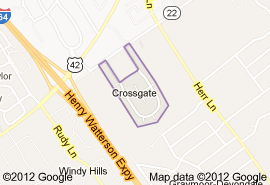 The Veterans Administration recently purchased land near the intersection of the Waterson Expressway and RT. 42 on which to build a replacement Robley Rex VA Hospital for Louisville and its surrounding region. One of the long sides of the site borders the tiny 6th class city of Crossgate. It has about 100 homes and a population of 225. The other long side abuts the Watterson. Local residents have been outspoken in their opposition to putting a hospital there, although some prefer it to another shopping center. Commonly expressed objections revolve around worsening traffic, visitors parking in their neighborhood streets, and security; but there are other concerns about the impact on their neighborhood.
The Veterans Administration recently purchased land near the intersection of the Waterson Expressway and RT. 42 on which to build a replacement Robley Rex VA Hospital for Louisville and its surrounding region. One of the long sides of the site borders the tiny 6th class city of Crossgate. It has about 100 homes and a population of 225. The other long side abuts the Watterson. Local residents have been outspoken in their opposition to putting a hospital there, although some prefer it to another shopping center. Commonly expressed objections revolve around worsening traffic, visitors parking in their neighborhood streets, and security; but there are other concerns about the impact on their neighborhood.
The purpose of the meeting this Saturday afternoon was to formalize a vote and discussion held earlier in the week for which in-person votes were necessary. The City Mayor and Commissioners feel the need for a “subject-matter expert” to guide them through the upcoming hospital construction project. The city’s current attorneys all have conflicts of interests that were not identified at the meeting. The city realizes that the former owners and developers of the land are out of the picture now. They are now dealing directly with the Veterans Administration which they feel has not provided them with information that they deserve, and have generally taken a high-handed approach with the city. [My words not theirs.]
Official Business.
The only resolution under consideration asked for authority to look for and select council to represent the City of Crossgate as hospital development proceeds, with an cap of $10,000 for the initial work. (That’s $100 per household.) The vote as I saw it was 5 commissioners in favor and one opposed– apparently over the possible costs.
Other Discussion.
There was some related discussion among the dozen residents in attendance. One had heard of preliminary plans for a campus-like development of several buildings not more than four stories tall, and a solid wall the length of the property line. Plans were supposedly for a hospital of about the same size as the existing one– around 110 beds (smaller than Norton Brownsboro Hospital). For specialty services not available, patients would be served in other hospitals or (I presume) in other VA-network hospitals as is currently the practice. None of this is official. I would hope that more will be revealed at the August 15 public meeting scheduled by the Veterans Administration.
Comments.
I was able to stay and chat with some of the residents afterwards. They were aware of this Policy Blog’s coverage and thought it fair. They also knew I had been a VA doctor all my professional life and they tried out some of their concerns and arguments on me. Most of these revolve around their belief that the chosen site is too small, made even smaller by encroachment from the new “slip-ramp” from the Waterson already under construction (see photos), or lack of proximity to University doctors. Some folks believe there is still a chance that the hospital could be built elsewhere. The nature of some of the questions they asked of me makes me suspect some downtown-location boosters are whispering in their ears. I predicted earlier that this would be the case. If so, expect some powerful political levers to be pulled.
The citizens of Crossgate deserve timely information that is as accurate as possible, recognizing that final plans are still being shaped. They also deserve that construction and operation of the hospital will be done according to usual community and business standards. They have a right to be dealt with fairly, and to have their concerns heard and mitigated to the extent possible. Fear of the unknown is often worse than reality. Could the Veterans Administration have done more to allay unwarranted concerns by revealing more of their plans? Who knows, but such large federal bureaucracies, particularly those with a military bent, are not always known for their flexibility, nimbleness, openness, or warm-fuzzyness. I suspect that lawyers would have been hired no matter where the hospital might have been located, including downtown Louisville where the potential for legal challenges would be much greater. I will not be surprised to see other neighboring Brownsboro communities maneuvering also. The VA has to navigate all of this, which unfortunately makes it necessary for them to be more circumspect.
It is very easy to tie public programs up in knots by by using their own regulations against them. Look what River Fields and others have done to delay the construction of new Ohio River bridges and infrastructure improvements in Louisville. This complex tension between the rights of individuals and the public good will flair again and again as our communities expand and reshape. For my own part, I do not believe the decision to build on the Brownsboro Rd. site was an unreasonable one. However, given the amount of information available to Crossgate residents, if I lived there, I too would probably have voted for council to inform and protect my interests. That’s not unreasonable either, nor necessarily selfish.
Peter Hasselbacher, MD
President KHPI
Emeritus Professor of Medicine, UofL
